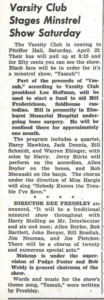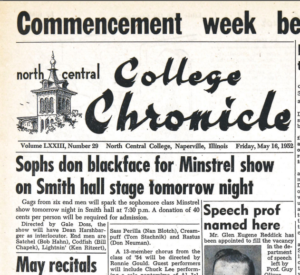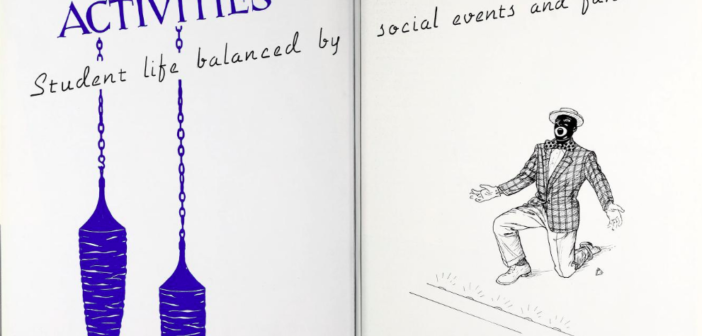America, NCC included, is tackling its racist past.
More specifically, institutions across the country are coming to terms with the early years of their universities. One recent example is Eastern Virginia Medical School addressing photos that emerged in a yearbook of the state governor in Ku Klux Klan garb and blackface.
Examples of politicians and key figures participating in minstrel shows and displaying blackface are continuing to emerge in the media. This has made the whole nation take a step back.
At NCC, students and faculty are grappling with recent revelations suggesting a racist past.
During a project in a historical methods course taught by Ann Keating, professor of history, students discovered material in The Chronicle and the yearbook from the 1900s that struck their interest. For this project, students research different aspects of NCC’s history. Jojo Galvan, Cynthia Apantenco and Matt Norvell are the students who made these discoveries.
“They found things that were not just fun but also disturbing,” said Keating.
These findings were shared with the campus community on March 26 with an email from President Hammond summarizing the findings and discussing the plan going forward. The email noted instances of “minstrel performances on campus, photos of students in blackface, references to the KKK, and uses of an n-word.”

Photo from the archives
The Chronicle and yearbook have been digitized back to the 19th century making them easier to look through. “When you get in and actually look at a paper then you start to think about other things that you might not have thought about if you were just asking a question cold from 2019 or whatever era you were looking at,” said Keating.
Students found articles discussing minstrel shows, celebrations with the use of blackface and the colleges overall racial attitudes in the 1900s. The College was not an integrated school until the late 1950s, early 1960s. The campus seemed to change drastically in the course of only one decade as a result of the incorporation of the civil rights movement as well as a progressive-thinking minister.
Keating is really “Saddened by this part of our history. These are offensive in whatever time period they are in. how we respond to the changes.”
Steve Macek, professor of communication, said that he was surprised, but not that surprised by the revelations. He said his research in higher education shows this coping with past ideals has been happening for years, especially with the resurgence of Black Lives Matter and black student activism on campuses.
“All the major institutions of Americans are deeply imbricated in the history of racism and white supremacy in this country,” said Macek. “We can’t find an institution, a bank, a religious organization that doesn’t have some skeletons in the closet.”

Photo from the archives
However, Macek was shocked by the extent to which students from this time period were involved in these activities. It’s something he said needs to be continuously discussed.
“This is an institution that has patted itself on the back for a long time for the fact that we had Dr. King here to speak, that part of our values as an institution is equality … we really need to have a searching discussion about this history and this ugly chapter at NCC,” said Macek.
According to Macek, Naperville was considered a “Sundown” town. This meaning African American individuals would not have been welcomed or safe in the city after sundown.
The archives provide the information available to the NCC community and it’s often hard to predict what will be uncovered. For many, images and text in both the yearbook and The Chronicle could be triggering. This garners the question of whether or not placing archival warnings in history is appropriate. While this is difficult, because often not all material is reviewed in archives, it may be necessary.
“I can say from having seen some of the images from the old issues of The Chronicle … that I think there’s a strong potential that African Americans and others would find it deeply troubling and offensive. It’s only fair to warn people,” said Macek.
Similarly, Keating said it’s appropriate to warn people, but nothing should be taken down because it’s important to keep the record whole.
NCC students and faculty are creating Fireside Chats to discuss the racial issues of the past and to keep the college moving forward.
Contributing reporting by Madeleine O’Connell, Madison Miller, Rudy Ruiz

